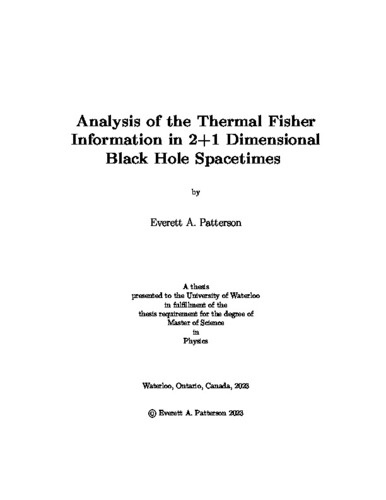| dc.contributor.author | Patterson, Everett Avison | |
| dc.date.accessioned | 2023-01-24 14:40:32 (GMT) | |
| dc.date.available | 2023-01-24 14:40:32 (GMT) | |
| dc.date.issued | 2023-01-24 | |
| dc.date.submitted | 2023-01-13 | |
| dc.identifier.uri | http://hdl.handle.net/10012/19108 | |
| dc.description.abstract | In the past decade, relativistic quantum information (RQI) has presented itself as a promising avenue for examining the interaction between relativistic and quantum effects.
This is most commonly achieved by coupling Unruh-DeWitt detectors to quantum fields in curved spacetime, or by applying quantum properties to otherwise relativistic systems. A lot of attention is placed on what information we can extract from the vacuum state of a quantum field and what can that tell us about the underlying spacetime.
While there has been a lot of theoretical progress made within the field, its experimental applications remain rather scarce. Relativistic quantum metrology (RQM), which concerns itself with the precision of measurements within systems that have both relativistic and quantum effects, is an example of an experimental flavour that RQI can take. One of the metrics of particular importance within RQM is the Fisher information. This form of `information' quantifies the knowledge that can be extracted about an underlying parameter based on the measurement of a dependent observable parameter.
In this thesis, we consider the thermal Fisher information extracted by a UDW detector in (2+1)-dimensional spacetimes, including the first Fisher information analysis of a black hole spacetime. We provide a detailed analysis of the Fisher information for the BTZ black hole including the identification of the true black hole effects by contrasting our black hole results against those in anti-de Sitter (AdS) spacetime. We further characterize its dependence on various black hole and detector parameters, in addition to describe how the Fisher information might be used as a black hole probe.
We find that the Fisher information is sensitive to the black hole parameters of mass and rotation. So much so in the case of the mass that based on the Fisher information for a given set up, we can identify the mass of the black hole. We also identify novel Fisher information behaviours unique to the BTZ black hole by contrasting these with AdS and previous results (which we actually correct). Beyond acting as a spacetime probe, the Fisher information analysis in this thesis can also enable the improvement of the estimation of the KMS temperature by a UDW detector.
The majority of the work in this thesis can be found on the arXiv in a publicly accessible manuscript [Patterson and Mann, 2022], and a second manuscript is in progress covering the remainder of the work presented here. | en |
| dc.language.iso | en | en |
| dc.publisher | University of Waterloo | en |
| dc.subject | Fisher information | en |
| dc.subject | Unruh-DeWitt detector | en |
| dc.subject | black hole | en |
| dc.subject | relativistic quantum information | en |
| dc.title | Analysis of the Thermal Fisher Information in 2+1 Dimensional Black Hole Spacetimes | en |
| dc.type | Master Thesis | en |
| dc.pending | false | |
| uws-etd.degree.department | Physics and Astronomy | en |
| uws-etd.degree.discipline | Physics | en |
| uws-etd.degree.grantor | University of Waterloo | en |
| uws-etd.degree | Master of Science | en |
| uws-etd.embargo.terms | 0 | en |
| uws.contributor.advisor | Mann, Robert | |
| uws.contributor.affiliation1 | Faculty of Science | en |
| uws.published.city | Waterloo | en |
| uws.published.country | Canada | en |
| uws.published.province | Ontario | en |
| uws.typeOfResource | Text | en |
| uws.peerReviewStatus | Unreviewed | en |
| uws.scholarLevel | Graduate | en |

